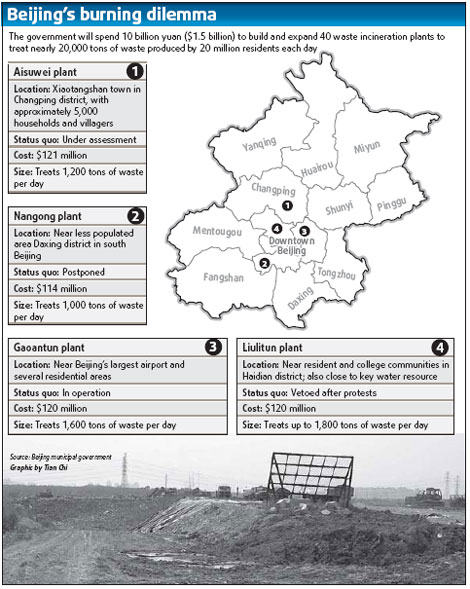
|
CHINA> Regional
 |
|
Incineration project gets locals all fired up
By Cui Xiaohuo (China Daily)
Updated: 2009-08-18 09:53 Chen Shu never expected to discover "such a big secret" when she went to the Changping district government building to complain about noisy road construction. At the corner of a bulletin board hung three pages of public hearing notices on a planned waste incineration project, the $121-million Asuwei plant. "I can't believe this is happening," said the middle-aged businesswoman who bought an apartment for her elderly parents and teenage son near the Xiaotangshan neighborhood in north Beijing in 2006. "I felt I discovered something big. It's a huge project, but officials just posted a notice in this dusty corner," Chen told China Daily. It was not long before an alliance of resistance formed among the region's 5,000 households. They are now collecting support to argue that building a 20-sq km incineration plant just 1 km away from their homes is a health hazard. "Laying aside whether it is safe to have a large waste plant near a populated area and how many toxic substances like dioxin the plant will unleash, we are especially unhappy because we feel the government tried to hide the truth and ignore our rights to know," said a leader of the campaign, who wished to remain anonymous.
Wang Shuquan, a government press official of Baishan county, where the plant is slated to be built, agreed "no one would like to see a garbage dump near their home". "But the plant has been a major project designated by the city government and it is generally for the public good. We can only try our best to straighten things up," he told China Daily. Experts responsible for assessing the environmental impact of the plant at the China Academy of Meteorological Sciences told China Daily that local residents can appeal and the project will not proceed if it fails an assessment. A project manager at Beijing Huayuan Huizhong Co. Ltd., which won the bid to build the project, also admitted the location of the Asuwei plant was "a tough decision" for the government, and his company will not build a plant that poses a hazard to local residents. As cities like Beijing face unprecedented ecologic challenges posed by tons of garbage produced daily, experts warn that waste burning is an impending issue the nation must soon address. Beijing's 20 million residents produce nearly 20,000 tons of garbage each day and the amount has overburdened its 23 waste treatment plants. Now the municipal government has decided it needs 40 plants by 2015, at a colossal cost of 10 billion yuan ($1.5 billion). "Waste incineration has become a nationwide problem as consumption in China grows by 10 percent each year," said Zhao Zhangyuan, a researcher at the Chinese Academy of Environment Science. "China still lacks a mature waste treatment system, so waste incineration in large cities and the emissions caused by it pose potential threats." Nie Yongfeng, a government advisor on environmental policies and a professor at Beijing's Tsinghua University, said China lacks a system to remove harmful and potentially toxic waste from incinerated trash. "Most of the waste in The Netherlands is incinerated, but we do have high standards, and with proper equipment dioxin emissions are extremely low," said Dr. Harry Aiking, an environmental specialist at the Institute for Environmental Studies at VU University in the Netherlands. But researchers said the authorities have seen limited success in controlling emissions from waste treatment. "The central government is firm on zero tolerance for toxic emissions from waste treatment plants and encourages the public to voice its concerns, but in most cases local authorities fail to comply," Zhao Zhangyuan told China Daily. Zhao Lili, who lives near a one-year-old garbage incineration plant near the Beijing Capital International Airport, said some residents keep their windows shut due to odors from the plant 3 km away. "You can detect the smell at once. It is a gross garbage smell," said Zhao. Although authorities have invested money to stop odors after locals protested last year, residents are afraid odorless gases like dioxin may still harm their health. Chen Shu insisted the locals are not troublemakers. "We are not against the government or anything, but we must defend our rights to breathe," she said.
 |